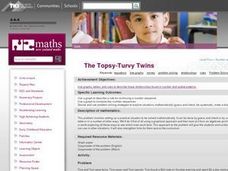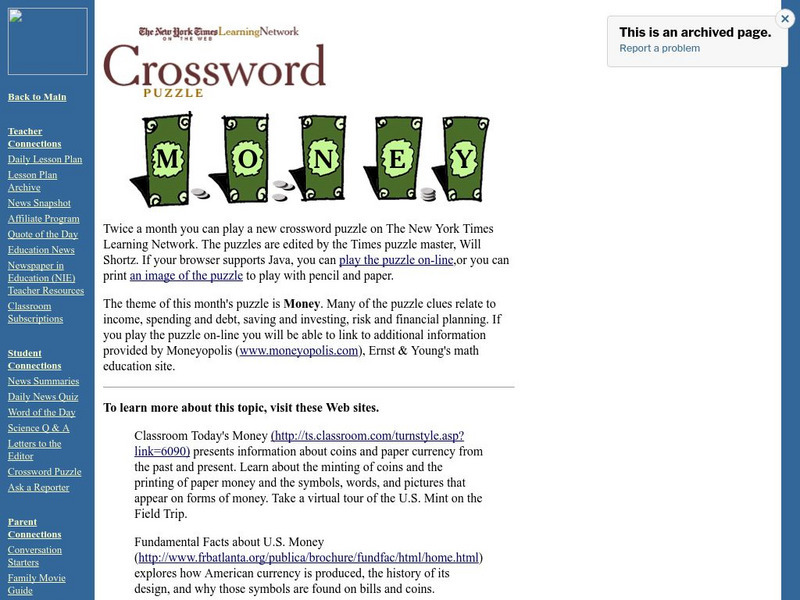Curated OER
Risky Business - Or Not!
Students explore the concept of the stock market. For this stock market lesson, students discuss the stock market and how it works. Students hypothesize what makes a stock price go up or down. Students watch a short video about the...
Curated OER
Should vs. Would Rather Exercise
In this vocabulary skills worksheet, students write 10 sentences using "should" and "rather" appropriately as they create compound sentences based on the information provided.
Curated OER
Private Sector Enticing Public into Final Frontier
Students study entrepreneurship in space. In this space science instructional activity, students discuss an article provided and explain why their senses are important to finding opportunities. Students list three possible opportunities...
Curated OER
What's the Best Age to Retire?
In this retirement worksheet, students read a 7-paragraph article regarding retirement ages around the world. Students respond to 7 graphic organizer, matching, and short answer questions regarding the article. Vocabulary words and...
Curated OER
Phrasal Verbs Quiz: Mixed
In this phrasal verbs worksheet, students check their understanding of various phrasal by chosing the answer that best completes each sentence.
Curated OER
Worksheet: The Great Depression
In this Great Depression worksheet, students respond to 8 short answer questions about the migration during the era, Hoovervilles, and the impact of movies.
Curated OER
Solid Waste Management
Sixth graders examine the role of packaging of everyday products and urge manufacturers to reduce the amount of it. They also discover how many products they use everyday can be recycled.
Curated OER
Aluminum Altruism
Students explore the value of recycling. They consider the importance of giving back to their school community. They calculate their earnings using multiplication and addition.
Curated OER
Reno's Dilemma
Students explain proportions as it relates to principle and interest. They use proportions to explain relationships and analyze relationships by identifying patterns.
Curated OER
Finding and Collecting in the Field
Students examine the types of plants brought over to America from immigrants. They research how some of these types of plants cause damage and alter the landscape. They record data and share the information with the community.
Curated OER
The Topsy-Turvy Twins
Fourth graders read the problem and brainstorm for ways to solve the problem - list these on the board for the students to refer to as they solve the problem. They work in pairs and focus on the strategy selected.
Curated OER
Dumptown Game
Students engage in an interactive play scenario. They are the new managers of a fictional city and live in a place where nothing is recycled. Students are faced with various problems that need to be solved. They work together to propose...
Consumer Financial Protection Bureau
Consumer Financial Protection Bureau: Evaluating Savings Scenarios
By analyzing real-world scenarios, students practice making informed decisions about savings tools to meet financial situations and needs. Includes teaching guide, a handout on options for saving money, and a student worksheet that can...
Council for Economic Education
Econ Ed Link: A Penny Saved Is a Penny at 4.7% Earned
This is a instructional activity from EconEdLink where students learn about saving money. Includes activities and materials.
Other
Economic Awareness Council: Ben Knows $: Money Smart Activities for Kids [Pdf]
It is never to early to begin saving money. Use this printable workbook to help young students learn concepts like the difference between want and need, the difference between saving and spending, what banks do, and how to budget to...
Practical Money Skills
Practical Money Skills: Lesson Two: Spending Plans
This lesson plan introduces children to the concept of dividing their money into categories, namely "save," "spend," and "share" and presents activities that will help them understand that money is limited in quantity and must be divided...
Consumer Financial Protection Bureau
Consumer Financial Protection Bureau: Saving Each Payday
Students use a real-world simulation to learn how saving a little money each payday can be a successful strategy for saving. Includes teaching guide and student worksheet that can be filled in on a computer.
Consumer Financial Protection Bureau
Consumer Financial Protection Bureau: Exploring Savings Habits
Students learn about the benefits of forming their own savings habits and explore what it looks like to save a percentage of income.
USA Today
Usa Today: Money
USA Today's Money section covers the very latest in domestic and world economic news. Coverage also includes in-depth articles and editorials.
Consumer Financial Protection Bureau
Consumer Financial Protection Bureau: Saving for Post Secondary Education
Students use an online compound interest calculator to answer questions and create charts that show the value of saving money over time for future education goals.
New York Times
New York Times: Crossword Puzzle: Money
An interactive & printable crossword puzzle developed by the New York Times Learning Network. The theme of this puzzle is Money.
Genius Brands International
Secret Millionaires Club: Webisode Activities
Backed by Warren Buffett, "the world's most famous investor," the Secret Millionaires Club teaches children about saving and investing money, about how businesses and credit cards work, and about the personal qualities that support...
University of Missouri
Wise Pockets World: Wise Pockets Clubhouse for Students
As students read the stories in the library, they learn about earning money, spending and saving money, and a bit about borrowing and lending money as well. Each story is followed by a short quiz and a printable activity.
Other
At Home With Math: Activities for Parents and Kids
These ten math activities encourage parents and their children ages 5-11 to work with math in the context of everyday activities like taking turns, saving money, or getting somewhere on time.

















